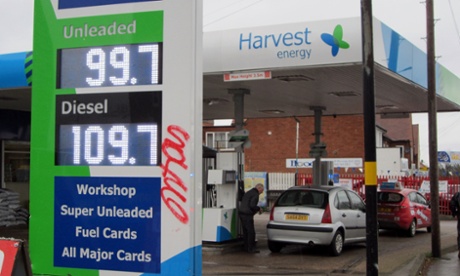
UK inflation unexpectedly halved in December to the lowest level on record as the sharp drop in global oil prices fed through to petrol pumps and the supermarket price war cut consumers shopping bills.
The government’s preferred measure of inflation fell to 0.5% in December from 1% in November, taking the consumer prices index (CPI) to the joint lowest level since equivalent records began in 1989. The only other time the CPI hit 0.5% was May 2000, and it has never been lower.
The extent of the drop took the City by surprise, with economists forecasting a smaller fall to 0.7%.
Paul Hollingsworth, UK economist at Capital Economics, said the continued drop in oil prices – now at about $46 per barrel – should mean the UK comes “within a whisker of deflation soon”.
Mark Carney, the governor of the Bank of England admitted that deflation in the UK was “possible” in the coming months. It would be the first time time the Britain’s headline rate of inflation was negative since March 1960.
However, Carney suggested a brief period of negative inflation was not the same as the potential dangerous deflationary spiral facing the eurozone, where consumers and businesses repeatedly put off spending because they expect prices to fall further.
“It’s possible prices will fall in a given month, on a year-on-year basis. That’s possible,” he told ITV News. “But the bigger economic question, the more relevant question for British households, is whether we see sustained and widespread falls in prices across a range of categories. We’re not seeing that.” Stripping out volatile items such as energy and food, so-called core inflation actually edged up to 1.3% in December from 1.2% in November.
Carney said the economy was enjoying a sweet spot with “low, stable, predictable” inflation.
Responding to the December inflation figures, the Chancellor George Osborne welcomed the lowest level of inflation in “modern times”, even though it is sharply below the Bank of England’s 2% target.
He said: “We have family budgets going further and the economic recovery starting to be widely felt. We will always remain vigilant that we have lower inflation for the right reasons.”
However Shabana Mahmood, Labour’s shadow Treasury minister, said the government could not take the credit for falling inflation. She said: “Plummeting global oil prices are the reason why the rate of inflation is falling here in Britain. But wages continue to be sluggish and the squeeze on living standards since 2010 means working people are £1,600 a year worse off under this government. “
Mark Carney will be required to write an open letter to the chancellor, explaining why inflation is more than a percentage point away from the 2% target. The exchange of letters between Carney and Osborne will be published alongside the Bank’s inflation report on 11 February.
It will be the first time a governor has been required to write a letter explaining why inflation is so low since the Bank’s independence in 1997. Back in 2000, when the CPI was below 1% for most of the year, then-governor Eddie George was not required to write a letter because at that time the Bank was targeting a different measure.
Cheaper petrol and food prices were the main driver of December’s drop in inflation, according to the Office for National Statistics, along with gas and electricity bills which were frozen this winter. In the year to December fuel prices were down 10.5% while food prices fell by 1.9%.
The average petrol price was 116.8p per litre with the average diesel price at 122.9p. That was 24.8p per litre below the peak average in April 2012, says the ONS.
Danny Alexander, the chief secretary to the Treasury, said the fall in oil prices - which have more than halved since last summer - was acting like “a giant tax cut for the economy, putting more money in the pockets of hard-pressed consumers”.
In the food category, where Britain’s biggest supermarkets are battling it out for customers, the price of vegetables fell 7.1% in the year to December, bread and cereals were down 2.5% and meat prices fell 1.8%. Television equipment dropped 10.5% over the period.
Items that increased in price included wine, up 3.5%, books, up 10.3%, and rail fares, which increased by 3.9%.
December’s drop in inflation was the latest sign that UK workers can look forward to a sustained period of real wage rises. Real pay fell for six years from 2008, as inflation consistently outpaced wage growth. However, with pay growth now at 1.6%, according to the latest ONS data, the government is hoping workers will start to feel the benefit in their pockets in the run-up to the election.
The backdrop of record-low inflation in the UK suggests the monetary policy committee will be in no hurry to raise interest rates, which have been at an all-time low of 0.5% since March 2009. The Bank signalled in November that the most likely timing of the first rate rise would be in the second half of 2015.
However, with inflation so low, some economists believe the first increase will be delayed until next year.
Martin Beck, senior economic advisor to the EY ITEM Club, said: “We would be surprised if the MPC will want to raise rates while inflation is very low. With inflation set to be below 1% for almost the whole of 2015, we do not expect the first rise to come before early 2016.”

